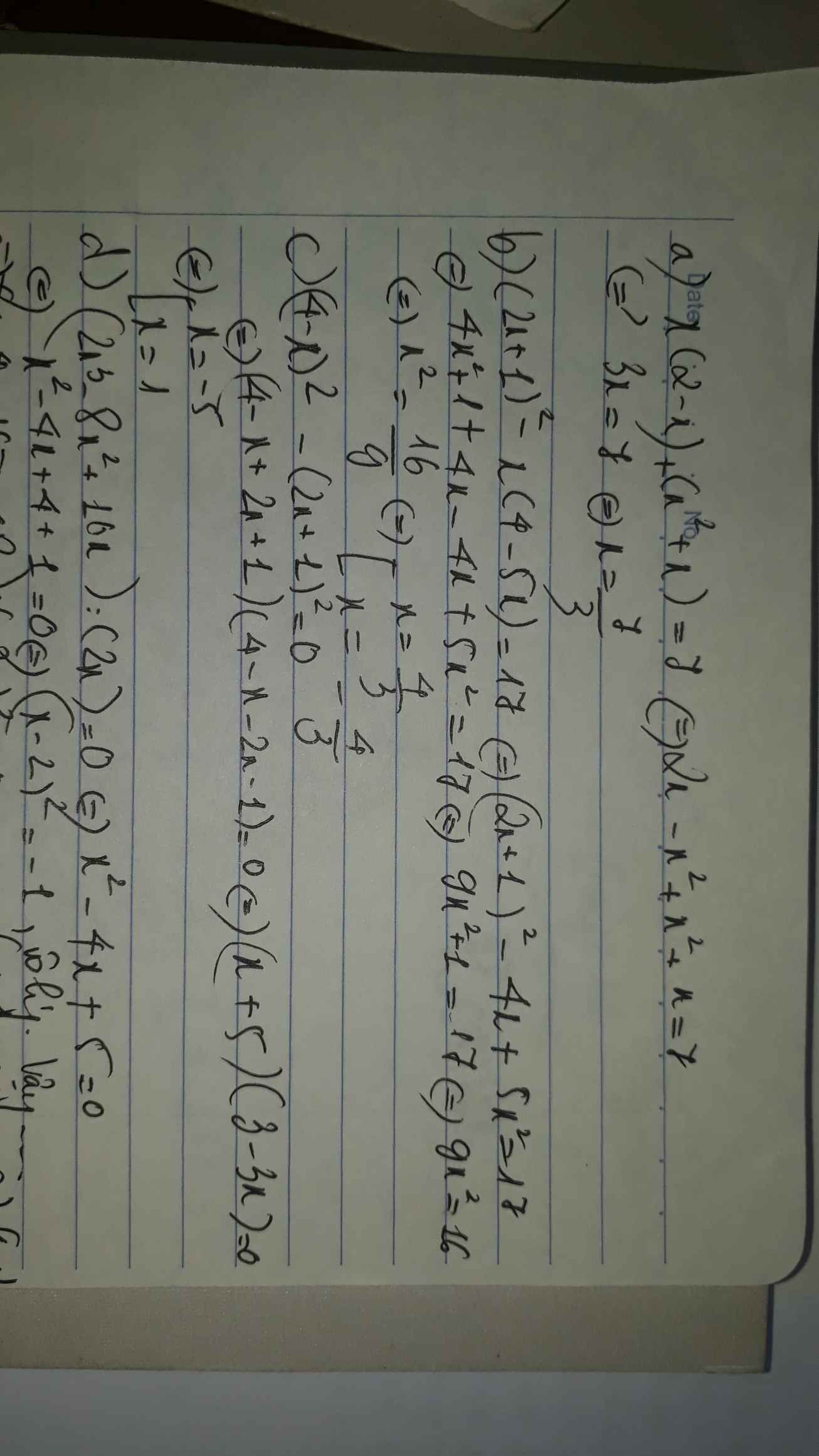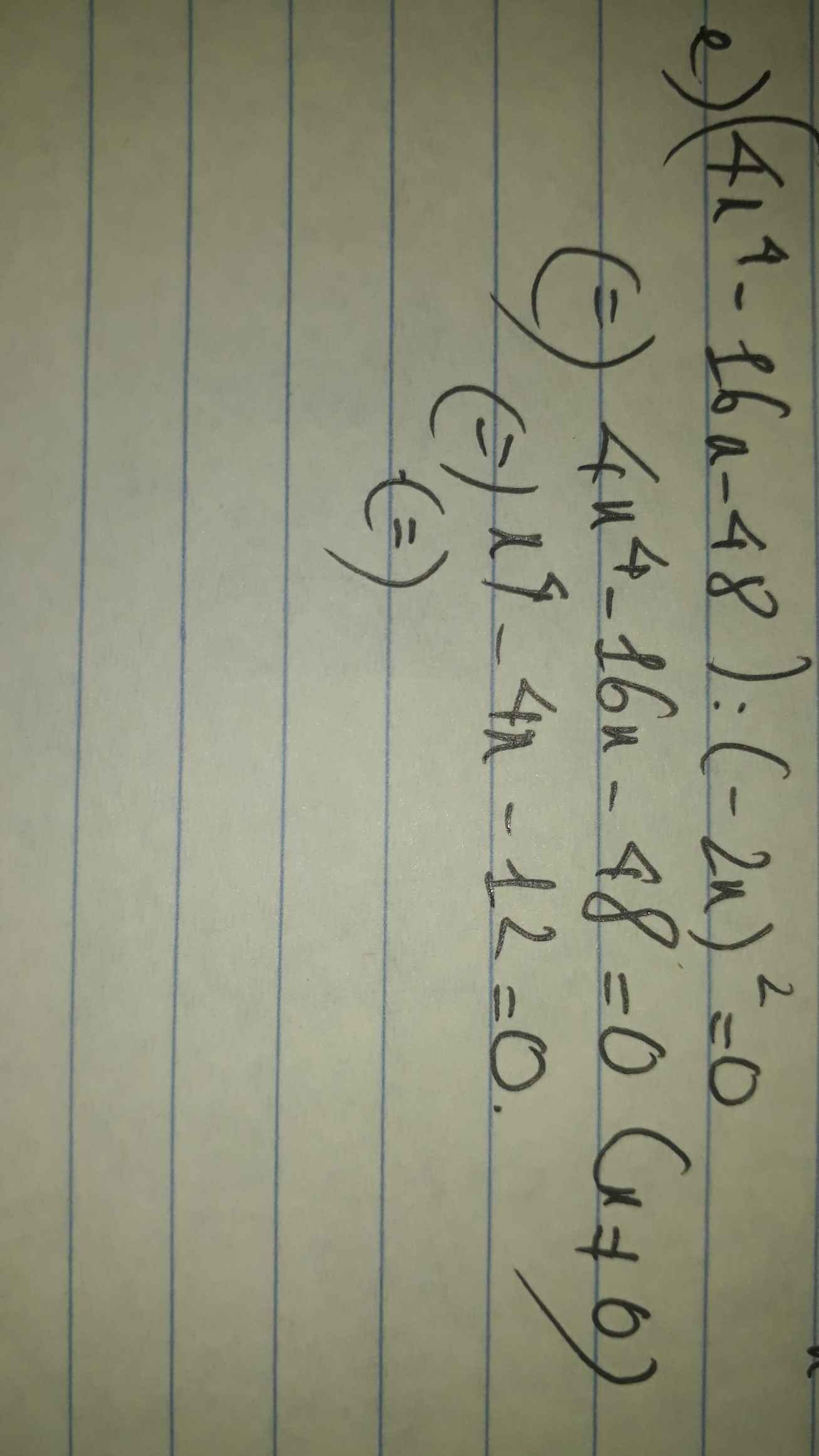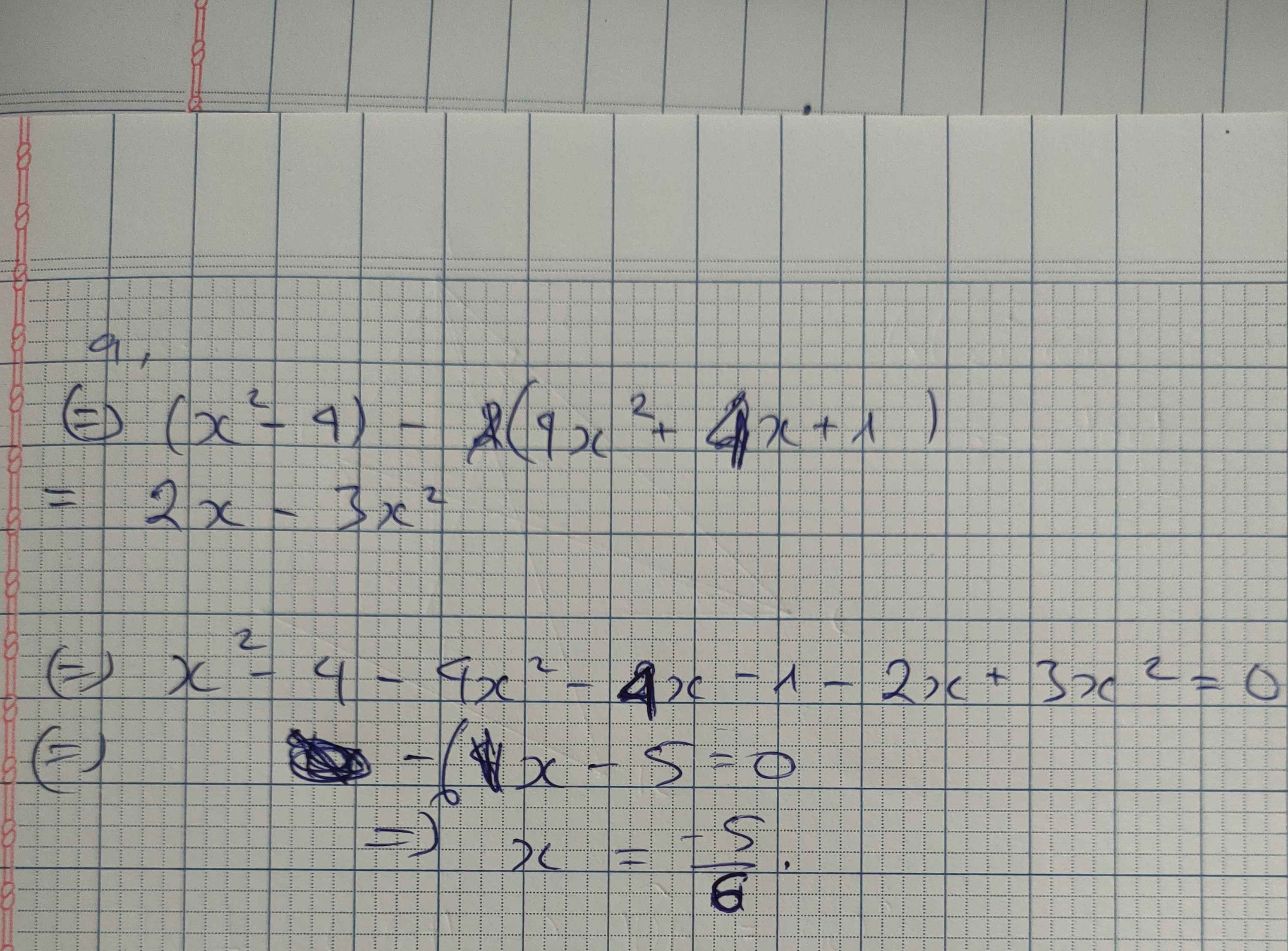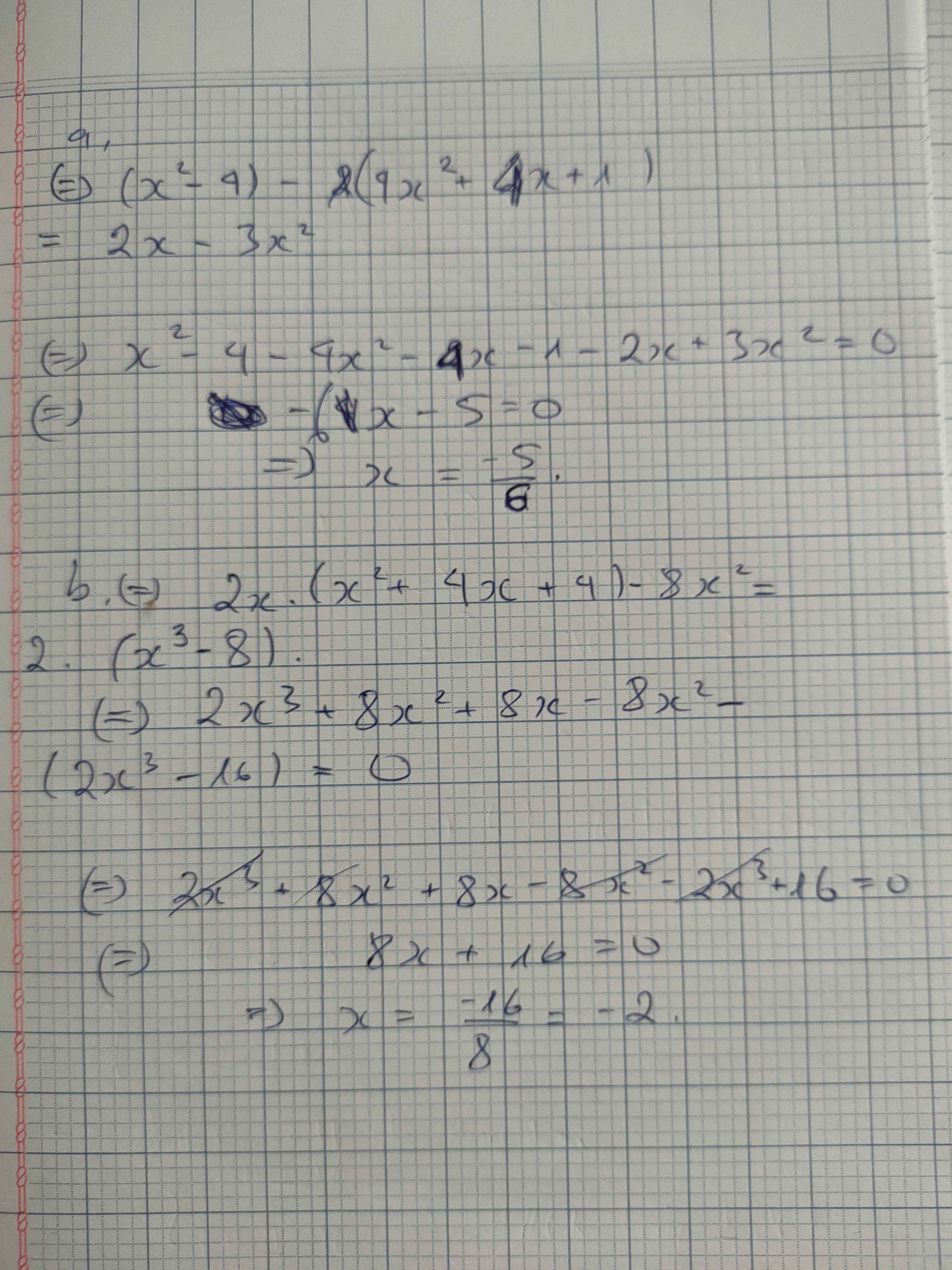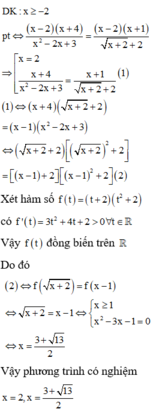2x(x+2)2-8x2=2(x-2)(x2+2x+4)
HT
Những câu hỏi liên quan
Tìm x:
a) x(2-x)+(x2+x)=7
b) (2x+1)2-x(4-5x)=17
c) (4-x)2-(2x+1)2=0
d) (2x3-8x2+10x) : (2x)=0
e) (4x4-16x-48) : (-2x)2=0
a: Ta có: \(x\left(2-x\right)+\left(x^2+x\right)=7\)
\(\Leftrightarrow2x-x^2+x^2+x=7\)
\(\Leftrightarrow3x=7\)
hay \(x=\dfrac{7}{3}\)
b: Ta có: \(\left(2x+1\right)^2-x\left(4-5x\right)=17\)
\(\Leftrightarrow4x^2+4x+1-4x+5x^2=17\)
\(\Leftrightarrow9x^2=16\)
\(\Leftrightarrow x^2=\dfrac{16}{9}\)
hay \(x\in\left\{\dfrac{4}{3};-\dfrac{4}{3}\right\}\)
Đúng 0
Bình luận (0)
c: Ta có: \(\left(x-4\right)^2-\left(2x+1\right)^2=0\)
\(\Leftrightarrow\left(x-4-2x-1\right)\left(x-4+2x+1\right)=0\)
\(\Leftrightarrow\left(x+5\right)\left(x-1\right)=0\)
\(\Leftrightarrow\left[{}\begin{matrix}x=-5\\x=1\end{matrix}\right.\)
d: ta có: \(\dfrac{2x^3-8x^2+10x}{2x}=0\)
\(\Leftrightarrow x^2-4x+5=0\)
\(\Leftrightarrow\left(x-2\right)^2+1=0\)(vô lý)
Đúng 0
Bình luận (0)
Bài 1 : giải phương trình
a) (x-2)(x+2)-(2x+1)2=x(2-3x)
b) 2x(x+2)2-8x2=2(x-2)(x2+2x+4)
c) (x-2)3+(3x-1)(3x+1)=(x+1)3
d) 5(2x-3)-4(5x-7)=19-2(x+1)2
a: \(\Leftrightarrow x^2-4-4x^2-4x-1-2x+3x^2=0\)
=>-6x-5=0
=>-6x=5
hay x=-5/6
b: \(\Leftrightarrow2x^3+8x^2+8x-8x^2-2x^3+16=0\)
=>8x+16=0
hay x=-2
c: \(\Leftrightarrow x^3-6x^2+12x-8+9x^2-1-x^3-3x^2-3x-1=0\)
=>9x-10=0
hay x=10/9
d: \(\Leftrightarrow10x-15-20x+28=19-2x^2-4x-2\)
\(\Leftrightarrow-10x+13+2x^2+4x-17=0\)
\(\Leftrightarrow2x^2-6x-4=0\)
\(\Leftrightarrow x^2-3x-2=0\)
\(\text{Δ}=\left(-3\right)^2-4\cdot1\cdot\left(-2\right)=9+8=17>0\)
Do đó: Phương trình có hai nghiệm phân biệt là:
\(\left\{{}\begin{matrix}x_1=\dfrac{3-\sqrt{17}}{2}\\x_2=\dfrac{3+\sqrt{17}}{2}\end{matrix}\right.\)
Đúng 1
Bình luận (0)
Xem thêm câu trả lời
Tìm x:
a) (3-2x)2-(3+2x)2=8
b) 9x5-72x2=0
c) 5x4-8x2-4=0
d) (x3+x2-4x-4) : (x-2)=0
Lời giải:
a. PT $\Leftrightarrow (3-2x-3-2x)(3-2x+3+2x)=8$
$\Leftrightarrow -4x.6=8$
$\Leftrightarrow -24x=8\Leftrightarrow x=\frac{-1}{3}$
b.
$9x^5-72x^2=0$
$\Leftrightarrow 9x^2(x^3-8)=0$
$\Leftrightarrow x^2=0$ hoặc $x^3=8$
$\Leftrightarrow x=0$ hoặc $x=2$
c.
$5x^4-8x^2-4=0$
$\Leftrightarrow 5x^4-10x^2+2x^2-4=0$
$\Leftrightarrow 5x^2(x^2-2)+2(x^2-2)=0$
$\Leftrightarrow (5x^2+2)(x^2-2)=0$
$\Leftrightarrow 5x^2+2=0$ (loại) hoặc $x^2-2=0$ (chọn)
$\Leftrightarrow x=\pm \sqrt{2}$
d.
PT $\Leftrightarrow [x^2(x+1)-4(x+1)]:(x-2)=0$
$\Leftrightarrow (x^2-4)(x+1):(x-2)=0$
$\Leftrightarrow (x-2)(x+2)(x+1):(x-2)=0$
$\Leftrightarrow (x+2)(x+1)=0$
$\Leftrightarrow x+2=0$ hoặc $x+1=0$
$\Leftrightarrow x=-2$ hoặc $x=-1$
Đúng 0
Bình luận (0)
a: Ta có: \(\left(3-2x\right)^2-\left(3+2x\right)^2=8\)
\(\Leftrightarrow9-12x+4x^2-9-12x-4x^2=8\)
\(\Leftrightarrow-24x=8\)
hay \(x=-\dfrac{1}{3}\)
b: Ta có: \(9x^5-72x^2=0\)
\(\Leftrightarrow9x^2\left(x^3-8\right)=0\)
\(\Leftrightarrow x^2\left(x-2\right)\left(x^2+2x+4\right)=0\)
\(\Leftrightarrow\left[{}\begin{matrix}x=0\\x=2\end{matrix}\right.\)
Đúng 0
Bình luận (0)
c: Ta có: \(5x^4-8x^2-4=0\)
\(\Leftrightarrow5x^4-10x^2+2x^2-4=0\)
\(\Leftrightarrow x^2-2=0\)
hay \(x\in\left\{\sqrt{2};-\sqrt{2}\right\}\)
Đúng 0
Bình luận (0)
Bài 1. Giải các phương trình sau bằng cách đưa về dạng ax + b 0:1. a) 5 – (x – 6) 4(3 – 2x) b) 2x(x + 2)2 – 8x2 2(x – 2)(x2 + 2x + 4) c) 7 – (2x + 4) – (x + 4) d) (x – 2)3 + (3x – 1)(3x + 1) (x + 1)3 e) (x + 1)(2x – 3) (2x – 1)(x + 5) f) (x – 1)3 – x(x + 1)2 5x(2 – x) – 11(x + 2) g) (x – 1) – (2x – 1) 9 – x h) (x – 3)(x + 4) – 2(3x – 2) (x – 4)2 i) x(x + 3)2 – 3x (x + 2)3 + 1 j) (x + 1)(x2 – x + 1) – 2x x...
Đọc tiếp
Bài 1. Giải các phương trình sau bằng cách đưa về dạng ax + b = 0:
1. a) 5 – (x – 6) = 4(3 – 2x) b) 2x(x + 2)2 – 8x2 = 2(x – 2)(x2 + 2x + 4)
c) 7 – (2x + 4) = – (x + 4) d) (x – 2)3 + (3x – 1)(3x + 1) = (x + 1)3
e) (x + 1)(2x – 3) = (2x – 1)(x + 5) f) (x – 1)3 – x(x + 1)2 = 5x(2 – x) – 11(x + 2)
g) (x – 1) – (2x – 1) = 9 – x h) (x – 3)(x + 4) – 2(3x – 2) = (x – 4)2
i) x(x + 3)2 – 3x = (x + 2)3 + 1 j) (x + 1)(x2 – x + 1) – 2x = x(x + 1)(x – 1)
2. a) ![]() b)
b) ![]()
c) ![]() d)
d) ![]()
e) ![]() f)
f) ![]()
g) ![]() h)
h) ![]()
i) ![]() k)
k) ![]()
m) ![]() n)
n) ![]()
bạn đăng tách cho mn cùng giúp nhé
Bài 1 :
a, \(\Leftrightarrow11-x=12-8x\Leftrightarrow7x=1\Leftrightarrow x=\dfrac{1}{7}\)
b, \(\Leftrightarrow2x\left(x^2+4x+4\right)-8x^2=2\left(x^3-8\right)\)
\(\Leftrightarrow2x^3+8x^2+8x-8x^2=2x^3-16\Leftrightarrow x=-2\)
c, \(\Leftrightarrow3-2x=-x-4\Leftrightarrow x=7\)
d, \(\Leftrightarrow x^3-6x^2+12x-8+9x^2-1=x^3+3x^2+3x+1\)
\(\Leftrightarrow3x^2+12x-9=3x^2+3x+1\Leftrightarrow x=\dfrac{10}{9}\)
e, \(\Leftrightarrow2x^2-x-3=2x^2+9x-5\Leftrightarrow x=5\)
f, \(\Leftrightarrow x^3-3x^2+3x-1-x^3-2x^2-x=10x-5x^2-11x-22\)
\(\Leftrightarrow-5x^2+2x-1=-5x^2-x-22\Leftrightarrow3x=-21\Leftrightarrow x=-7\)
Đúng 1
Bình luận (1)
h) \(PT\Leftrightarrow x^2+4x-3x-12-6x+4=x^2-8x+16\)
\(\Leftrightarrow3x=24\)
\(\Leftrightarrow x=8\)
Vậy: \(S=\left\{8\right\}\)
j) \(PT\Leftrightarrow x^3-x^2+x+x^2-x+1-2x=x^3-x\)
\(\Leftrightarrow x=1\)
Vậy: \(S=\left\{1\right\}\)
Đúng 1
Bình luận (0)
Phân tích
a,(x2 + x + 2)3 - (x+1)3 x6 +1 b,(x2 + 10x + 8)2 - (8x + 4)(x2 + 8x+7)
c, A x4 + 2x3 + 3x2 + 2x+4 d,B x4 + 4x3 + +8x2 + 8x + 4
e, C x4 - 2x3 + 5x2 - 4x + 4
Đọc tiếp
Phân tích
a,(x2 + x + 2)3 - (x+1)3 = x6 +1 b,(x2 + 10x + 8)2 - (8x + 4)(x2 + 8x+7)
c, A= x4 + 2x3 + 3x2 + 2x+4 d,B= x4 + 4x3 + +8x2 + 8x + 4
e, C= x4 - 2x3 + 5x2 - 4x + 4
phân tích đa thức thành nhân tử . Câu hỏi của nguoiemtinhthong.Bài 1.1.2x2+5x−17x3−1−−−−−√1.1.2x2+5x−17x3−1Bài 1.2.3x−1−−−−√+2x+1−−−−√5x2−1−−−−−√41.2.3x−1+2x+15x2−14Bài 1.3.3x2+4x−5−−−−−−−−−√+x−3−−−−√11x2+25x+2−−−−−−−−−−−−√1.3.3x2+4x−5+x−311x2+25x+2Bài 1.4.2x2−2x+23(x−2)(x2+x)−−−−−−−−−−−−√1.4.2x2−2x+23(x−2)(x2+x)Bài 1.5.4x2−4x−108x2−6x−10−−−−−−−−−−−√1.5.4x2−4x−108x2−6x−10Bài 1.6.2x2+3x+1−−−−−−−−−−√−2x2−2−−−−−−√x+1
Đọc tiếp
phân tích đa thức thành nhân tử . Câu hỏi của nguoiemtinhthong.
Bài 1.1.2x2+5x−1=7x3−1−−−−−√1.1.2x2+5x−1=7x3−1
Bài 1.2.3x−1−−−−√+2x+1−−−−√=5x2−1−−−−−√41.2.3x−1+2x+1=5x2−14
Bài 1.3.3x2+4x−5−−−−−−−−−√+x−3−−−−√=11x2+25x+2−−−−−−−−−−−−√1.3.3x2+4x−5+x−3=11x2+25x+2
Bài 1.4.2x2−2x+2=3(x−2)(x2+x)−−−−−−−−−−−−√1.4.2x2−2x+2=3(x−2)(x2+x)
Bài 1.5.4x2−4x−10=8x2−6x−10−−−−−−−−−−−√1.5.4x2−4x−10=8x2−6x−10
Bài 1.6.2x2+3x+1−−−−−−−−−−√−2x2−2−−−−−−√=x+1
Nếu ol thì tham khảo nah nguoiemtinhthong.
1.1
2x2+5x−1=7x3−1−−−−−√2x2+5x−1=7x3−1
⇔2(x2+x+1)+3(x−1)−7(x−1)(x2+x+1)−−−−−−−−−−−−−−−√(1)⇔2(x2+x+1)+3(x−1)−7(x−1)(x2+x+1)(1)
Đặt a=x−1−−−−−√;b=x2+x+1−−−−−−−−√;a≥0;b>0a=x−1;b=x2+x+1;a≥0;b>0
pt (1) trở thành 3a2+2b2−7ab=03a2+2b2−7ab=0
a=2ba=2b v a=13ba=13b
Các bạn tự giải quyết tiếp nhé.
1.2
TXĐ D=[1;+∞)D=[1;+∞)
đặt a=x−1−−−−−√4;b=x+1−−−−−√4;a,b≥0a=x−14;b=x+14;a,b≥0
pt (2) trở thành 3a2+2b2−5ab=03a2+2b2−5ab=0
⇔a=b⇔a=b v a=23ba=23b
...
1.3
D=[3;+∞)D=[3;+∞)
Đặt a=x2+4x−5−−−−−−−−−√;b=x−3−−−−−√;a,b≥0a=x2+4x−5;b=x−3;a,b≥0
pt (3) trở thành 3a+b=11a2−19b2−−−−−−−−−√3a+b=11a2−19b2
⇔2a2−6ab−20b2=0⇔2a2−6ab−20b2=0
⇒a=5b⇒a=5b
...
1.4
ĐK
⇔2x2−2x+2=3(x−2)x(x+1)−−−−−−−−−−−−√2x2−2x+2=3(x−2)x(x+1)
⇔(x2−2x)+2(x+1)=3(x2−2x)(x+1)−−−−−−−−−−−−−√2(x2−2x)+2(x+1)=3(x2−2x)(x+1)
Đặt x2−2x−−−−−−√=ax2−2x=a; x+1−−−−−√=bx+1=b (a;b\geq0)
⇔2a2+2b2=3ab
1.5
Đặt 4x2−4x−10=t4x2−4x−10=t (t \geq 0)
⇔t=t+4x2−2x−−−−−−−−−−√t=t+4x2−2x
⇔t2−t−4x2+2x=0t2−t−4x2+2x=0
Δ=1−4(2x−4x2)=(4x−1)2Δ=1−4(2x−4x2)=(4x−1)2
⇒t=1−2xt=1−2x hoặc t=2xt=2x
Đúng 0
Bình luận (0)
1.1
2.2+5.-1=7.3-1-----v2.2+5.-1=7.3-1
2(.2+x+1)+3(x-1)
3a+b=11a2-19b2
tóm tắt
Đúng 0
Bình luận (0)
Phân tích đa thức thành nhân tử:
a) x2-36y2-x+6y
b) 16x-8x2+x3
c) 2x2-4xy+2y2-18
d) 3x2-7x-10
e) x4-x2-30
f) x2-xy-2y2
g) x4-13x2y2+4y4
h) (x2-2x)2-2(x2-2x)-3
a) \(=\left(x+6y\right)\left(x-6y\right)-\left(x-6y\right)\)
\(=\left(x-6y\right)\left(x-6y-1\right)\)
b) \(=x\left(x^2-8x+16\right)\)
\(=x\left(x-4\right)^2\)
c) \(=2\left(x-y\right)^2-18\)
\(=2\left[\left(x-y\right)^2-3^2\right]\)
\(=2\left(x-y+3\right)\left(x-y-3\right)\)
Đúng 0
Bình luận (0)
a: \(x^2-36y^2-x+6y\)
\(=\left(x-6y\right)\left(x+6y\right)-\left(x-6y\right)\)
\(=\left(x-6y\right)\left(x+6y-1\right)\)
b: \(x^3-8x^2+16x\)
\(=x\left(x^2-8x+16\right)\)
\(=x\left(x-4\right)^2\)
c: \(2x^2-4xy+2y^2-18\)
\(=2\left(x^2-2xy+y^2-9\right)\)
\(=2\left(x-y-3\right)\left(x-y+3\right)\)
d: \(3x^2-7x-10\)
\(=3x^2+3x-10x-10\)
\(=3x\left(x+1\right)-10\left(x+1\right)\)
\(=\left(x+1\right)\left(3x-10\right)\)
Đúng 0
Bình luận (0)
e: Ta có: \(x^4-x^2-30\)
\(=x^4-6x^2+5x^2-30\)
\(=x^2\left(x^2-6\right)+5\left(x^2-6\right)\)
\(=\left(x^2-6\right)\left(x^2+5\right)\)
f: Ta có: \(x^2-xy-2y^2\)
\(=x^2-2xy+xy-2y^2\)
\(=x\left(x-2y\right)+y\left(x-2y\right)\)
\(=\left(x-2y\right)\left(x+y\right)\)
g: Ta có: \(x^4-13x^2y^2+4y^4\)
\(=x^4-4x^2y^2+4y^4-9x^2y^2\)
\(=\left(x^2-2y^2\right)^2-\left(3xy\right)^2\)
\(=\left(x^2-3xy-2y^2\right)\left(x^2+3xy-2y^2\right)\)
Đúng 0
Bình luận (0)
Phân tích đa thức thành nhân tử: (mình cần gấp ạ :3)
a) x2-36y2-x+6y
b) 16x-8x2+x3
c) 2x2-4xy+2y2-18
d) 3x2-7x-10
e) x4-x2-30
f) x2-xy-2y2
g) x4-13x2y2+4y4
h) (x2-2x)2-2(x2-2x)-3
a: Ta có: \(x^2-36y^2-x+6y\)
\(=\left(x-6y\right)\left(x+6y\right)-\left(x-6y\right)\)
\(=\left(x-6y\right)\left(x+6y-1\right)\)
b: Ta có: \(16x-8x^2+x^3\)
\(=x\left(x^2-8x+16\right)\)
\(=x\left(x-4\right)^2\)
c: Ta có: \(2x^2-4xy+2y^2-18\)
\(=2\left(x^2-2xy+y^2-9\right)\)
\(=2\cdot\left[\left(x-y\right)^2-9\right]\)
\(=2\left(x-y-3\right)\left(x-y+3\right)\)
d: Ta có: \(3x^2-7x-10\)
\(=3x^2+3x-10x-10\)
\(=3x\left(x+1\right)-10\left(x+1\right)\)
\(=\left(x+1\right)\left(3x-10\right)\)
Đúng 1
Bình luận (0)
e: Ta có: \(x^4-x^2-30\)
\(=x^4-6x^2+5x^2-30\)
\(=x^2\left(x^2-6\right)+5\left(x^2-6\right)\)
\(=\left(x^2-6\right)\left(x^2+5\right)\)
f: Ta có: \(x^2-xy-2y^2\)
\(=x^2-2xy+xy-2y^2\)
\(=x\left(x-2y\right)+y\left(x-2y\right)\)
\(=\left(x-2y\right)\left(x+y\right)\)
g: Ta có: \(x^4-13x^2y^2+4y^4\)
\(=x^4-4x^2y^2+4y^4-9x^2y^2\)
\(=\left(x^2-2y^2\right)^2-\left(3xy\right)^2\)
\(=\left(x^2-3xy-2y^2\right)\left(x^2-3xy+2y^2\right)\)
\(=\left(x^2-3xy-2y^2\right)\left(x^2-xy-2xy+2y^2\right)\)
\(=\left[x\left(x-y\right)-2y\left(x-y\right)\right]\left(x^2-3xy-2y^2\right)\)
\(=\left(x-y\right)\left(x-2y\right)\left(x^2-3xy-2y^2\right)\)
h: Ta có: \(\left(x^2-2x\right)^2-2\left(x^2-2x\right)-3\)
\(=\left(x^2-2x\right)^2-3\left(x^2-2x\right)+\left(x^2-2x\right)-3\)
\(=\left(x^2-2x\right)\left(x^2-2x-3\right)+\left(x^2-2x-3\right)\)
\(=\left(x^2-2x-3\right)\left(x^2-2x+1\right)\)
\(=\left(x-3\right)\left(x+1\right)\cdot\left(x-1\right)^2\)
Đúng 1
Bình luận (0)
Biết phương trình
x
2
+
2
x
-
8
x
2
-
2
x
+
3
x
+
1
x
+...
Đọc tiếp
Biết phương trình x 2 + 2 x - 8 x 2 - 2 x + 3 = x + 1 x + 2 - 2 có tổng các nghiệm là a + b c a , b , c ∈ ℤ Hỏi giá trị của a+b+c là
A. 15
B. 22
C. 9
D. 17
Cho biểu thức P 1+ 3/x2+5x+6 : ( 8x2/ 4x3-8x2 - 3x/ 3x2-12 -1/x+2)A) Rút gọn PB) Tìm các giá trị của x để P 0; P 1C) Tìm cã giá trị của x để P 0Cho biểu thứcQ (2x-x2/ 2x2 +8 - 2x2/ 3x3-2x2+4x-8) (2/x2 + 1-x/x)A) Rút gọn QB) Tìm giá trị nguyên của x để Q có giá trị nguyên
Đọc tiếp
Cho biểu thức P= 1+ 3/x2+5x+6 : ( 8x2/ 4x3-8x2 - 3x/ 3x2-12 -1/x+2)
A) Rút gọn P
B) Tìm các giá trị của x để P= 0; P= 1
C) Tìm cã giá trị của x để P> 0
Cho biểu thức
Q= (2x-x2/ 2x2 +8 - 2x2/ 3x3-2x2+4x-8) (2/x2 + 1-x/x)
A) Rút gọn Q
B) Tìm giá trị nguyên của x để Q có giá trị nguyên
Bài 1:
a) Ta có: \(P=1+\dfrac{3}{x^2+5x+6}:\left(\dfrac{8x^2}{4x^3-8x^2}-\dfrac{3x}{3x^2-12}-\dfrac{1}{x+2}\right)\)
\(=1+\dfrac{3}{\left(x+2\right)\left(x+3\right)}:\left(\dfrac{8x^2}{4x^2\left(x-2\right)}-\dfrac{3x}{3\left(x-2\right)\left(x+2\right)}-\dfrac{1}{x+2}\right)\)
\(=1+\dfrac{3}{\left(x+2\right)\left(x+3\right)}:\left(\dfrac{4}{x-2}-\dfrac{x}{\left(x-2\right)\left(x+2\right)}-\dfrac{1}{x+2}\right)\)
\(=1+\dfrac{3}{\left(x+2\right)\left(x+3\right)}:\dfrac{4\left(x+2\right)-x-\left(x-2\right)}{\left(x-2\right)\left(x+2\right)}\)
\(=1+\dfrac{3}{\left(x+2\right)\left(x+3\right)}\cdot\dfrac{\left(x-2\right)\left(x+2\right)}{4x+8-x-x+2}\)
\(=1+3\cdot\dfrac{\left(x-2\right)}{\left(x+3\right)\left(2x+10\right)}\)
\(=1+\dfrac{3\left(x-2\right)}{\left(x+3\right)\left(2x+10\right)}\)
\(=\dfrac{\left(x+3\right)\left(2x+10\right)+3\left(x-2\right)}{\left(x+3\right)\left(2x+10\right)}\)
\(=\dfrac{2x^2+10x+6x+30+3x-6}{\left(x+3\right)\left(2x+10\right)}\)
\(=\dfrac{2x^2+19x-6}{\left(x+3\right)\left(2x+10\right)}\)
Đúng 0
Bình luận (0)


